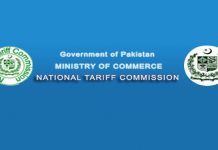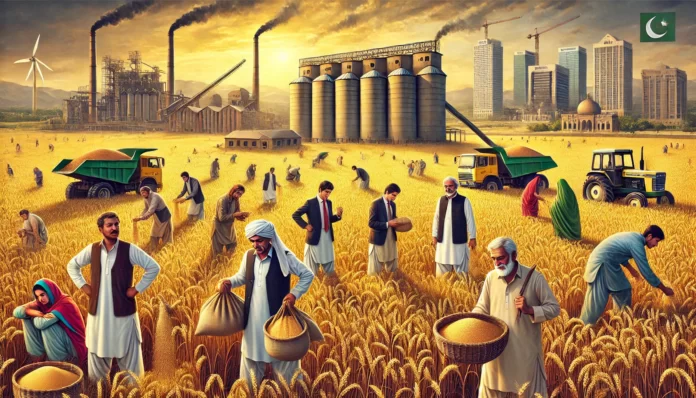Two years. That is how long the Punjab Government has to phase out the wheat support price it issues every year. It is a subsidy addiction that has afflicted the entire country since at least 1968, but Punjab has year in and year out been the biggest offender.
The death knell for Pakistan’s massive wheat subsidy programme was sounded by the International Monetary Fund, which announced in early September that provincial governments would be barred from setting crop prices as part of its $7 billion bailout package, board approval for which Pakistan secured only a few weeks ago. It is possibly one of the reasons why the Punjab Government has abolished the provincial food department, replacing it with a new autonomous body.
The wheat support price is a bigger problem than one might realise. The concept behind wheat procurement is that the government buys wheat from farmers at a set rate which is higher than what they would get on the market so they continue to grow what is a strategically important crop. The problem is, provincial governments borrow heavily from commercial banks to fund these operations.
In 2023, for example, the wheat procurement target was 40 lakh tonnes and the government had set a price of Rs3,900 per maund (a unit of measuring weight equal to 40 kilograms), or around Rs97.5 per kilogram. To buy this much wheat from farmers at this rate, the government would need around Rs394 billion. Now, the government sells the wheat they acquire to flour mills at this rate so they do recover this money. However, the government relies on borrowing this sum from commercial banks. At an interest rate of 23% in 2023, the government would be paying around Rs90 billion in monthly instalments of 10 months through selling wheat to flour mills. The government also always procures more wheat than it needs and consistently has leftover grain from previous years in storage.
On top of this, the government also needs to spend tens of billions of rupees on handling, transportation and storage costs incurred by the PASSCO on a federal level. The government regularly fails to live up to its commitment with commercial banks, and over time, this has led to circular debt. In 2020, this had risen to Rs757 billion.
Why then do we insist on having these wheat support prices every year? The government will tell you that their aim is to give confidence and provide security to poorer farmers, as well as get cheap flour to the markets. They are lying. All indicators and an impressive body of academic literature on the topic tells us leaving crop prices up to market forces is what is best for farmers. The content in this publication is expensive to produce. But unlike other journalistic outfits, business publications have to cover the very organizations that directly give them advertisements. Hence, this large source of revenue, which is the lifeblood of other media houses, is severely compromised on account of Profit’s no-compromise policy when it comes to our reporting. No wonder, Profit has lost multiple ad deals, worth tens of millions of rupees, due to stories that held big businesses to account. Hence, for our work to continue unfettered, it must be supported by discerning readers who know the value of quality business journalism, not just for the economy but for the society as a whole.To read the full article, subscribe and support independent business journalism in Pakistan


























I am sorry to say that the writer didn’t know the exact concept of support prices for farmers of their crop. I advise to writer that please first study the concept in detail before writing such a misleading article.
next time there farmer won’t be sown wheat crop. go to IMF they will give you free wheat
This is only one side of mirror,totally as that of an ignorant person. If the wheat price left on market rate, it would be good for farmers. The problem is, it is being controlled by CM Punjab on a very low price. If any one buys or sell on higher rates, the Govt is filing FIR against such persons. So the farmers have decided not to grow wheat, but other profitable crops such as oil seeds canola etc
The best strategy, which is in favour of the farmers, mill owners as well as the society at large, is to leave wheat crop to market forces like all other crops, instead of fixing wheat prices by the government and thereby exposing the farmers and other stakeholders to the vicious clutches and corrupt practices prevalent in the Food Departments.
Toxic neoliberalism will now eat up the farmers. Do attend the funerals when they start committing suicides.
Farmers are being crushed and punished for growing wheat. How? Government of Punjab is not procuring wheat at the announced rate but filing bogus FIR against merchants for purchasing wheat at more than Rs2800. Market price without this forced unannounced cap would immediately rise to +Rs3500. Let the free market determine the market rate.
A very dangerous consequence of this policy may result in farmers switching over to other crops like corn and rice and reduced wheat planting in the coming wheat season.
I would like to inform you that in late fifties the US dumped also in Pakistan their surplus wheat under Pl,280 program. This was free wheat and the government sold it at a very nominal rate resulting in farmers not growing in subsequent years
Forany years we remained a big importer.
Slowly wheat production again picked up and now this fiasco involving a US loan agency. No angles by any definition ,again forcing Pakistan into a situation where we do not have food security. Very shortsighted policy of the government
shut your dirty mouth sooner or later there will be fine here. And every one will.saw the consequences. No wheat will be farmed extra government have to pay this in coming years.
good initivate for farmers
سبسڈی سب سے زیادہ،بڑا کاروبار،سیٹھ لیتا ہے،اسکے بہت سے طریقے ہوتے،کبھی فکسڈ ریٹ پر گیس،بجلی اور کبھی امپورٹ پر ڈیوٹیوں کی کمی!!!
“At every turn, they face a system designed to exclude the very people it claims to serve, leaving them with little choice but to sell at a loss or spend days navigating a bureaucratic maze.”
That is the story of all power centers be it bureaucracy, judiciary, police, military (not ‘establishment’ as you step around it), etc. No one truly serves the public or does their own defined job as required by law and official mandate leading to public suffrage.